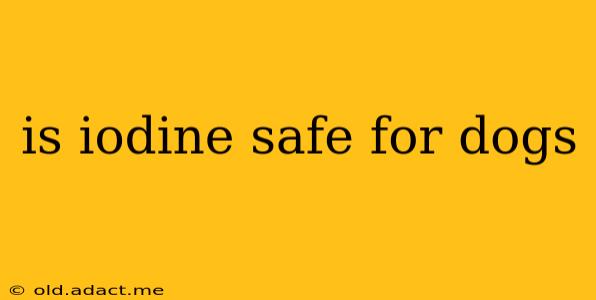Iodine is an essential trace mineral for humans and animals, playing a crucial role in thyroid hormone production. However, the safety of iodine for dogs hinges entirely on the form, amount, and method of administration. While a small amount of iodine is necessary for canine health, an excess can be incredibly toxic. This guide will explore the complexities of iodine and canine safety.
What are the different forms of iodine?
Iodine comes in various forms, each with different levels of toxicity and absorption in dogs. Understanding these differences is crucial for ensuring your pet's safety.
- Iodine in dog food: Commercial dog food typically contains trace amounts of iodine, which are generally considered safe and necessary for a balanced diet. These levels are carefully regulated to avoid toxicity.
- Iodine supplements: These should never be given to a dog without explicit veterinary guidance. Overdosing on iodine supplements can lead to serious health problems. The correct dosage depends heavily on the dog's size, breed, age, and overall health.
- Povidone-iodine (Betadine): This antiseptic solution is commonly used topically on minor wounds in humans and animals. While generally safe for external use in small amounts, ingestion can be dangerous.
- Other iodine-containing products: Household products, such as some disinfectants or cleaning solutions, may contain iodine. Keep these products out of reach of your dog to prevent accidental ingestion.
Is it possible for a dog to overdose on iodine?
Yes, absolutely. Iodine overdose in dogs can manifest in various ways, depending on the severity of the exposure. Symptoms can range from mild gastrointestinal upset (vomiting, diarrhea) to more severe issues like:
- Excessive salivation
- Loss of appetite
- Lethargy
- Weakness
- Tremors
- Seizures
- Respiratory distress
- Death (in severe cases)
What are the signs of iodine toxicity in dogs?
Recognizing the signs of iodine toxicity is vital for prompt veterinary intervention. If you suspect your dog has ingested a significant amount of iodine, even if you're unsure of the source, immediately contact your veterinarian or an emergency animal hospital. Timely treatment significantly improves the chances of a positive outcome. Key signs to watch for include:
- Vomiting: Frequent and forceful vomiting is a strong indicator of potential poisoning.
- Diarrhea: Watery or bloody diarrhea should be taken seriously.
- Excessive drooling: More saliva than usual can signal a problem.
- Lethargy and weakness: A sudden decrease in energy levels is concerning.
- Tremors or seizures: These are serious neurological signs and require immediate attention.
How is iodine toxicity in dogs treated?
Treatment for iodine toxicity depends on the severity of the poisoning and the amount ingested. Your veterinarian might induce vomiting, administer activated charcoal to absorb the iodine, or provide supportive care to manage symptoms. In severe cases, hospitalization may be necessary. Never attempt to treat iodine poisoning at home.
Can I give my dog iodine for a thyroid condition?
Absolutely not. Never administer any iodine-containing medication or supplement to your dog without explicit instruction from your veterinarian. Thyroid conditions in dogs require careful diagnosis and a tailored treatment plan, which may or may not involve iodine. Self-treating can be incredibly dangerous and potentially fatal.
What should I do if my dog ingests iodine?
If you suspect your dog has ingested iodine, regardless of the amount or form, immediately contact your veterinarian or an emergency animal hospital. Provide as much detail as possible about the suspected iodine source, the approximate amount ingested, and any symptoms your dog is exhibiting. Prompt action is critical. The sooner treatment begins, the better the outcome.
Conclusion:
While iodine is essential for canine health in trace amounts, it's crucial to remember that excess iodine is highly toxic. Always keep iodine-containing products out of your dog's reach and never administer iodine supplements or medication without consulting your veterinarian. Early intervention is key in managing iodine toxicity and ensuring your dog's well-being.
